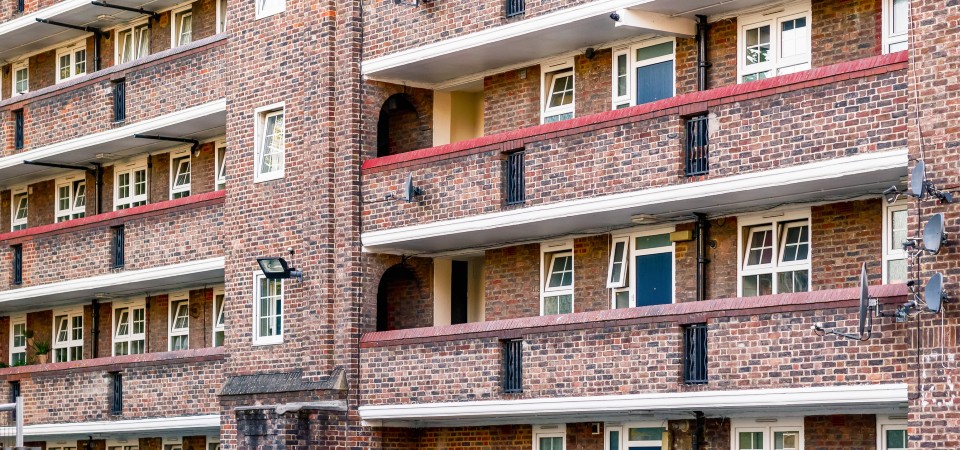The 2024 MIS London study, focusing on what households with children need to live with dignity, highlights the growing disparity between London and other urban areas of the UK.
It found that 4 in 10 Londoners (41%) – and half of all children – live in households with incomes below the minimum required for a dignified standard of living.
The withdrawal of social housing as a realistic option has forced the inclusion of private rent costs in MIS budgets – a move that reflects both the scarcity of social housing stock and its increasing unsuitability.
In Inner London, the rent for a three-bedroom property in the private sector is now more than 2.5 times higher than in the social sector (£487 vs £182 per week), dramatically increasing the income households need just to cover basic needs.
Key Findings:
- For the first time, MIS groups agreed that access to social housing is no longer a reasonable assumption for families with children
- The switch to private rents significantly raises costs:
- A couple with two children in Inner London now needs to earn £41,600 each per year to reach MIS, compared to £34,700 in other UK urban areas
- A lone parent with two children needs 57% more in Inner London and 34% more in Outer London than their counterparts outside the capital
- 3.7 million Londoners, including over 1 million children, live in households below MIS
- A single working-age adult in Inner London needs 70% more than those living in other UK urban areas, and needs to earn £47,300 annually (vs. £28,000 outside London) to reach MIS
- Households relying solely on benefits fall far below the MIS threshold. A non-working couple with two children renting privately in Inner London has no disposable income left after covering rent and council tax
The report also draws attention to systemic challenges that continue to put pressure on Londoners: the high cost of childcare, rising transport expenses, and a chronic lack of affordable housing.
Shelter estimates that moving from private to social housing could save renters over £1,400 per month, yet MIS findings show this is not a realistic option for many.
Now in its tenth year, the MIS London programme has tracked the evolving standard of living needed to live with dignity in the capital.
Despite government and mayoral commitments to raise living standards, many Londoners remain in survival mode.
“A dignified life means more than just getting by,” said Professor Matt Padley, co-director of CRSP and the report’s lead author. “It means having enough to eat, a secure home, opportunities for children to thrive, and the ability to take part in society.
“Yet today, too many find themselves facing impossible decisions, between paying rent, heating their homes, or buying school uniforms.
“It is telling that ten years after we began the MIS London research, many households in London are facing the same challenges and the same limitations on how much they can take part in the life of the city.
“Yes, we have seen progress on wages, with substantial increases in the National Living Wage over this period.
“But even working full time at this level doesn’t leave people with enough to live with dignity. When rent and any childcare costs have been covered, what is left falls well short of what’s needed to live with dignity.
“Much needs to change to make sure that London is a city that works for all who live there, not just the wealthiest.
“Looking back in 10 years’ time, let’s hope that some of this change has happened, that we have made real progress in addressing the unavoidable costs, like rent, that put so much pressure on incomes, and that as a consequence more of those who call London home are able to live in the city with dignity.”
MIS London continues to offer an evidence-based benchmark for what households need to live decently in the capital. The report calls for bold policy change, including:
- Increased investment in public services and affordable childcare
- Boosting benefit levels and the National Living Wage
- Expanding access to genuinely affordable, appropriate housing
As London looks ahead, MIS research provides a crucial tool for holding decision-makers accountable. Without decisive intervention, the cost of merely surviving in London will continue to rise – leaving little room for millions of Londoners to truly thrive.
Klara Skrivankova, director of grants at Trust for London, said: “It's shocking that in one of the world’s wealthiest cities in the world, half of all children are growing up in households that don’t have enough for a basic standard of living.
“Housing is at the heart of this crisis. The chronic shortage of social homes forces people into the expensive, often poor quality private rented sector, leaving them with little left for other essentials.
“If we want London to be a city where everyone can live with dignity and security, we need bold action to tackle the housing crisis.
“That starts with building vastly more social homes and raising Local Housing Allowance rates so that more homes are affordable to low-income Londoners.”
ENDS
